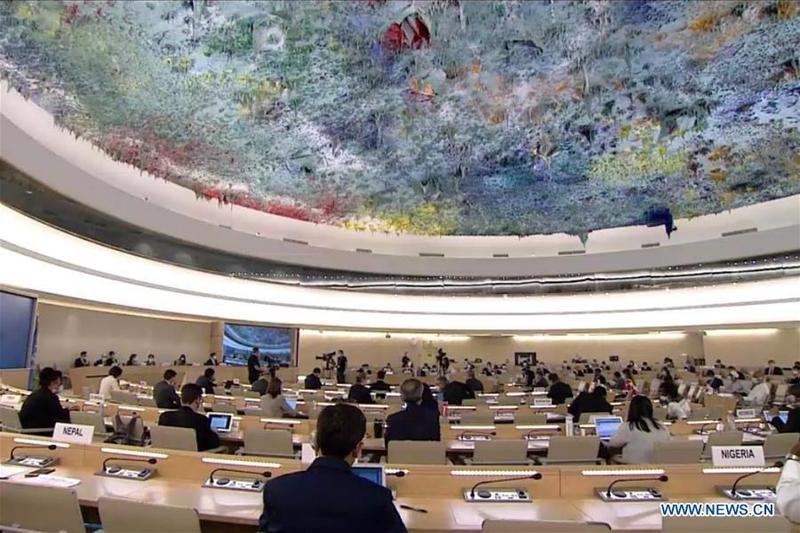Both US and Canada struggle with police handling of deaths of black people and other minorities
 Video image taken on June 19, 2020 shows a session of the UN Human Rights Council held in Geneva, Switzerland. (PHOTO / XINHUA)
Video image taken on June 19, 2020 shows a session of the UN Human Rights Council held in Geneva, Switzerland. (PHOTO / XINHUA)
Days after a UN resolution against racism practices, the United States and Canada find themselves struggling with cases relating to deaths of people of color.
The United Nations Human Rights Council adopted a resolution strongly condemning the continuing racially discriminatory and violent practices perpetrated by law enforcement agencies against Africans and people of African descent.
The resolution, in particular, condemned police brutality that led to the deaths of US citizen George Floyd in Minneapolis and other people of African descent.
The resolution, adopted by consensus on June 19 without a vote in the 47-member UN body, also deplored the recent incidents of excessive use of force and other human rights violations by law enforcement officers against peaceful demonstrators defending the rights of Africans and people of African descent.
The resolution asked the UN High Commissioner for Human Rights to prepare a report on systemic racism, violations of international human rights law, and abuses against Africans and people of African descent by law enforcement agencies.
Many journalists have reported attacks while doing their job in the United States, with some estimates going as high as “148 arrests or attacks” in the US between May 26 and June 2.
The resolution was adopted after an urgent debate on current racially inspired human rights violations, systemic racism, police brutality and violence against peaceful protests.
Amina Mohammed, deputy secretary-general of the UN, via video teleconference, said that the debate is a “historic debate”, given that Afro-descendants still face poverty and structural racism.
“I too, like Martin Luther King Jr, have a dream that my granddaughter Maya will grow up in a world where she will not be judged by the color of her skin but by the strength of her character,” she said.
Michelle Bachelet, UN High Commissioner for Human Rights, said the wave of protests since the killing of George Floyd had been truly global, and encouraged the council to heighten its focus on racism and racial discrimination.
US Ambassador to the United Nations in Geneva Andrew Bremberg resorted to whataboutism in a statement, saying that “We are not above scrutiny” but “any HRC resolution on this topic that calls out countries by name should be inclusive.”
Back in the United States, the chief of police in Tucson, Arizona, on June 24 offered to resign after he released a video showing the death of a Latino man who said “he could not breathe” as police handcuffed him and placed him face down on his stomach.
Carlos Ingram-Lopez, 27, died on April 21, police restraining him in a “prone position” with his hands behind his back for about 12 minutes, police chief Chris Magnus told a news briefing.
The video showed Ingram-Lopez repeatedly asking for water, crying out, moaning and breathing heavily until he eventually falls silent. Three police officers resigned over the incident, Magnus said.
A South Carolina prosecutor said on June 24 that he will not file charges against the white police officer who fatally shot a black teenager who pointed a gun at the officer as he ran away. A review of the investigation led to the decision not to charge Columbia police officer Kevin Davis in the death of Josh Ruffin, Fifth Circuit Solicitor Byron Gipson said at a news conference.
But in Atlanta, three white men have been finally indicted on murder charges in the killing of Ahmaud Arbery, a black man fatally shot while running in a neighborhood near Georgia’s coast on Feb 23. Prosecutor Joyette Holmes announced on June 24 that a grand jury has indicted Travis McMichael, Greg McMichael and William “Roddie” Bryan Jr on charges including malice and felony murder in Arbery’s death.
Canadians are facing a reckoning of their own. Since April, six indigenous people have been fatally shot by police, including a woman killed during a “wellness check”, and a video went viral of a First Nations chief being beaten by Royal Canadian Mounted Police (RCMP) officers in March.
In the decade spanning 2007 to 2017, indigenous people accounted for more than a third of people shot to death by RCMP officers, despite numbering just 5 percent of the population.
A study in Nova Scotia found black residents were six times more likely to be subjected to street checks than were white people.
Agencies contributed to the report.


